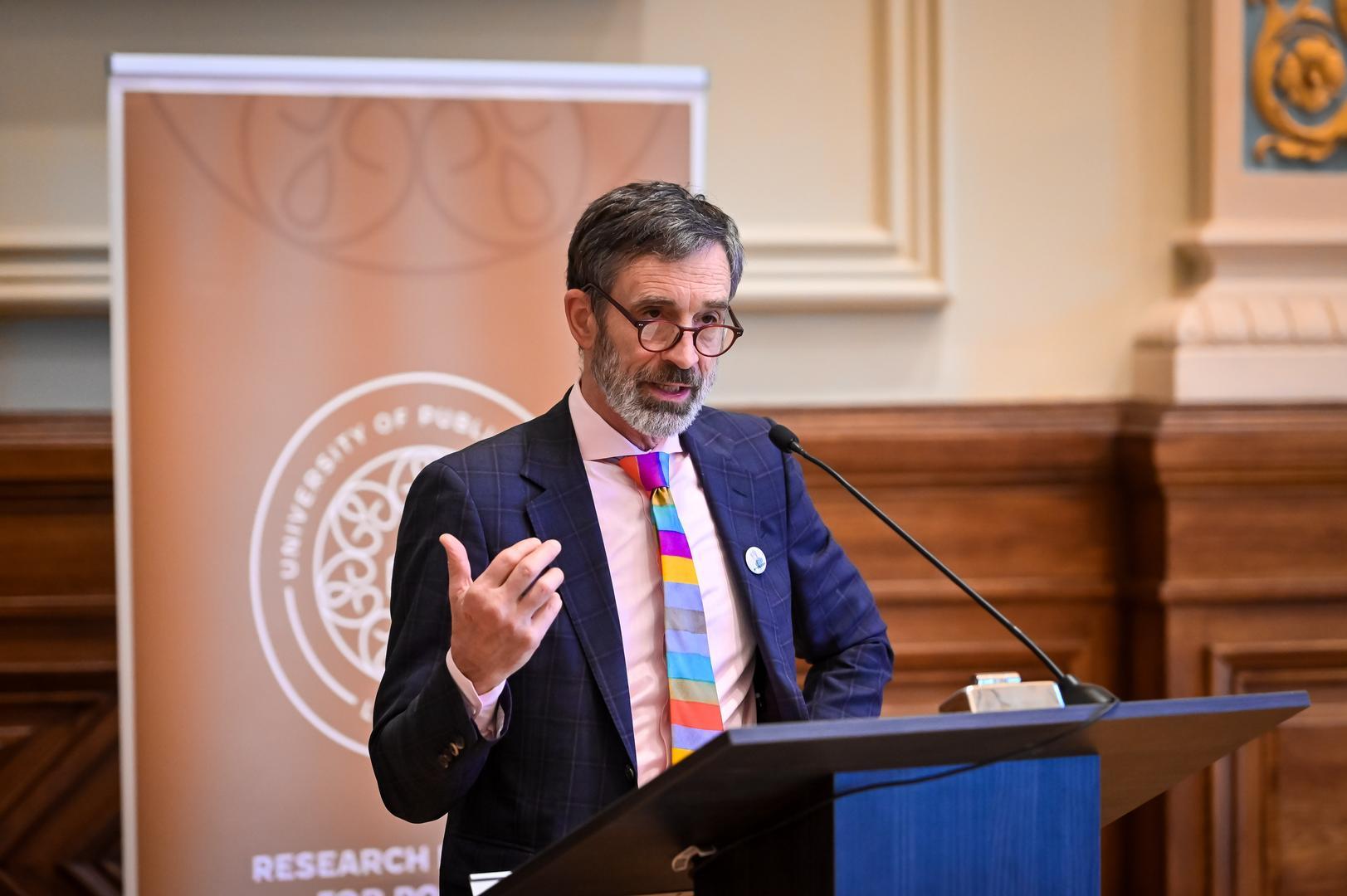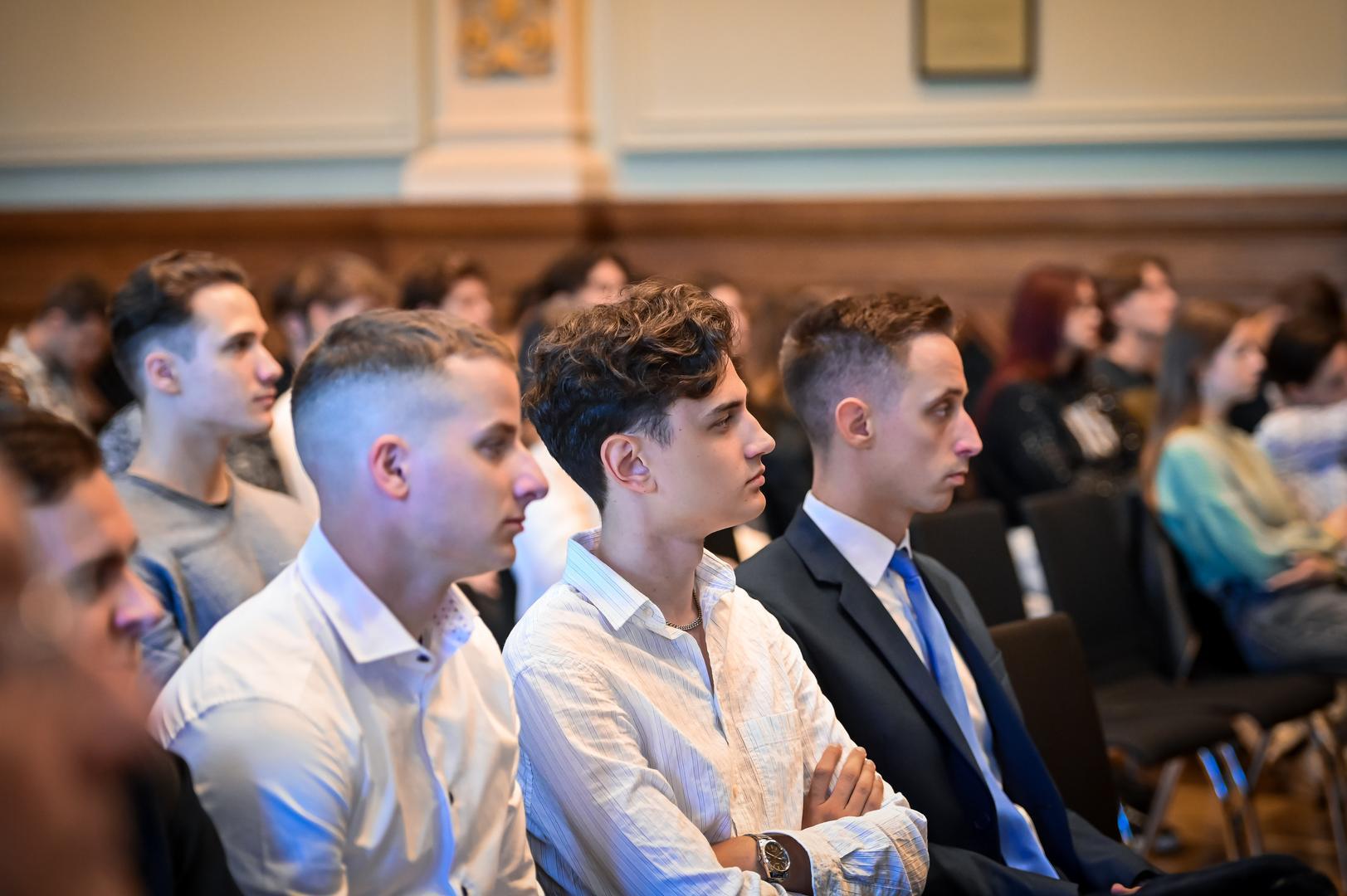 An international conference on Christianity and Politics was held at the Research Institute for Politics and Government of the Eötvös József Research Centre at the Ludovika University of Public Service on 2-3 October 2023.
An international conference on Christianity and Politics was held at the Research Institute for Politics and Government of the Eötvös József Research Centre at the Ludovika University of Public Service on 2-3 October 2023.
The organizers of the conference, Tamás Nyirkos (Ludovika UPS RIPG), Bernát Török (director of Eötvös József Research Centre at Ludovika UPS), and Ferenc Hörcher (director of RIPG) shared their thoughts on the role of Christianity in the shaping of culture and identity in Europe, deeming it crucial for the long-term survival of secular Western democracy and liberalism.
The first plenary lecture of the conference was held by R. R. Reno, editor-in-chief of the American journal First Things, who outlined his views on Christian politics in a secular age. According to him, secularism is the key feature of modernity, an era defined by the struggle between the party of change and the party of permanence. The former is trying to „bend the arc of history” in order to create a perfectly just society, while the latter respects human nature and traditional authorities, leaving the solid anchors of life intact, relying on the will of God in its strives to implement good political leadership.
The first panel of the conference consisted of three lectures. Steven Hayward (University of California, Berkeley) warned of the dangerous socio-political implications of sectarian progressive politics that has already reached the point of attacking reason itself if it stands in the way of their utopian political goals.
Linda L. Denno (University of Arizona) highlighted the importance for conservatives not to reject the Christianity-inspired basic value of equality before the law.
Ferenc Hörcher (Ludovika UPS RIPG) discussed the concept of the person and its political implications in the philosophy of German Catholic conservative thinker Robert Spaemann.
The second plenary lecture of the first day of the conference was held by William T. Cavanaugh (DePaul University, Chicago) under the title Idolatry and the future of Christianity in a secularized world. According to his views, secularization did not result in complete disenchantment, but in the relocation of the holy from the church to the state and the market eventuating in even stronger forms of magic than Catholicism. He referred to Rusty Reno’s book on the return of the „strong gods” like nation, truth, religion, marriage. Cavanaugh expressed his rejection to the idea of the „strong gods”, especially nationalism, and stood up for a return of the „weak God”, referring to Pope Francis’s statements on the practical implementation of Christian morality.
The second panel of the opening day consisted of three lectures.
Kálmán Tóth (Ludovika UPS RIPG) analyzed Lajos Kossuth’s concept of Christianity as a political utopia, elaborated in his public speech on The Future of Nations he held in New York in 1852.
Hans-Otto Seitschek (Ludwig-Maximilians-Universität, München) discussed Jacob L. Talmon’s concept of political messianism.
Tamás Nyirkos (Ludovika UPS RIPG) examined the terminology of „new religions”, pointing out the controversial nature of such widely-used terms like political/secular/quasi religion, demonstrating the impossibility to distinguish these from the „real” religions on a scientific basis.

The second day of the conference started with the plenary lecture of Carolina Armenteros (Pontificia Universidad Catolica Madre y Maestra) on the Enlightenment origins of modern Catholic apologetics, highlighting the impact of Enlightenment on French and Spanish conservative and liberal Catholic thinkers like Chateaubriand, de Maistre, de Bonald and Donoso Cortés.
The next panel included the lecture of Ádám Smrcz (Ludovika UPS RIPG) on the assessment of reason of state-theories in early anti-Machiavellian discourse and the lack of dividing lines between the representatives of different confessions.
Then, Róbert Papp (MCC, Budapest) discussed the role of a transcendent set of morality in the American Declaration of Independence.
This was followed by Ádám Darabos (Ludovika UPS), who characterized the development of the theological and political thinking of Reinhold Niebuhr and the possible lessons Hungarian conservatives can draw from it.
The concluding panel started with András Máté-Tóth’s (University of Szeged) lecture on socio-theological inspirations from Central and Eastern Europe, arguing for the necessity of healing wounded collective identities of the region based on collective forgiveness, described by him as the strength of the weak.
Michal Gierycz (Cardinal Stefan Wyszynski University, Warsaw) discussed his views on the liberal and conservative „temptations” of the contemporary Catholic Church.
The conference ended with a presentation by András Jancsó (Ludovika UPS) concerning the various meanings of the term political theology, analysing the origins of its Schmittian concept, its Christian criticism by Erik Peterson, and the political implementation of Christian values in the „new” political theology of Johann Baptist Metz.
Kálmán Tóth
research fellow
Ludovika UPS EJRC Research Institute for Politics and Government
Photo: Dénes Szilágyi